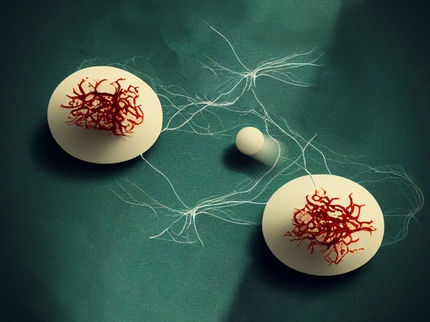Store and Supply – How the Brain Saves Time
neurons in the brain store RNA molecules – DNA gene copies – in order to rapidly react to stimuli. This storage dramatically accelerates the production of proteins. This is one of the reasons why neurons in the brain can adapt quickly during learning processes.

A storage of RNA molecules allows the brain to rapidly react to neuronal stimuli.
University of Basel, Biozentrum
Our brain is not only the most complex organ of the human body, it is also the most flexible. But how do neurons in the brain adapt their function in response to stimuli within a very short time frame?
The research group of Prof. Peter Scheiffele at the Biozentrum, University of Basel, has demonstrated that neurons store a reserve stock of RNA molecules, copies of the DNA, in the cell’s nucleus. These RNA molecules form the blueprint for new proteins. After a neuronal stimulus the stored RNA molecules are mobilized in order to adjust the function of the neuron. The process of RNA synthesis (DNA copying) is very slow especially for large genes. Thus, this newly uncovered mechanism for mobilization of stored RNAs saves time and provides new insights regarding the fast adaptation of the brain during learning processes.
Storage for RNA molecules
The RNA blueprint for proteins is produced by a sophisticated copying process: First a basic RNA copy of the DNA is generated. From this copy, individual sections, so-called introns, are subsequently cut out to provide a finalized blueprint for the production of a specific protein. This process is called RNA splicing.
So far, it was assumed, that neuronal stimuli trigger the complete process for the production of new RNA molecules. However, the team of Peter Scheiffele now discovered that neurons in the brain pre-manufacture certain immature RNA copies which are only partially spliced. These RNA molecules still contain some introns and are stored in the cell nucleus. Signals induced by neuronal stimulation trigger the splicing completion of the immature RNA molecules.
“The copying process of the DNA, the so-called transcription, is already finalized in advance by the neurons. Hence, mature RNA molecules can be produced within minutes,” explains Oriane Mauger, the first author.
Prepared copies save time
For large genes, the production of the initial version of the RNAs itself takes dozens of hours. “The fact that the RNA molecules are already available in an immature form and only need to be completed, shortens the whole process to a few minutes”, says Mauger. “Since the transcription is very time-consuming, the storage of RNA means a significant time saving. This enables neurons to quickly adapt their function.”
“This study reveals a completely new regulatory mechanism for the brain”, declares Scheiffele. “The results provide us with a further explanation of how neurons steer rapid plasticity processes.”
Original publication
Other news from the department science

Get the life science industry in your inbox
By submitting this form you agree that LUMITOS AG will send you the newsletter(s) selected above by email. Your data will not be passed on to third parties. Your data will be stored and processed in accordance with our data protection regulations. LUMITOS may contact you by email for the purpose of advertising or market and opinion surveys. You can revoke your consent at any time without giving reasons to LUMITOS AG, Ernst-Augustin-Str. 2, 12489 Berlin, Germany or by e-mail at revoke@lumitos.com with effect for the future. In addition, each email contains a link to unsubscribe from the corresponding newsletter.
Most read news
More news from our other portals
Last viewed contents

LDC and Cumulus Oncology Announce Collaboration - Discovery and development of novel oncology therapies

Stem cell secrets allow researchers to revamp reprogramming - Researchers have identified factors required to generate naïve stem cells by reprogramming

CF di Ciro Fiocchetti & C. s.n.c. - Luzzara, Italy
RIKEN and SISSA develop new biological analysis methods




















































